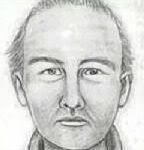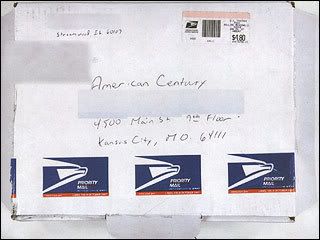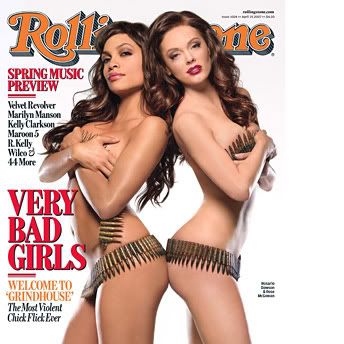
FBI Investigates Possible Letter Bomber Case
http://www.npr.org/templates/story/story.php?storyId=7532240
The FBI is investigating a case with echoes of the Unabomber, who sent bombs through the mail for more than 15 years. Two package bombs have been sent to financial services companies in the Midwest in recent weeks. The bombs weren't wired to explode. But investigators worry the next one may be.
Someone calling himself "the Bishop" has been mailing threatening letters to financial services companies; they upped the ante in recent weeks by mailing two pipe bombs, one to an investment firm in Kansas City, and the other to a firm in Chicago.
The letters include demands that Wanda Shipp, a postal inspector based in Chicago, says are very specific.
"The letters that were sent with the bombs were designed to threaten, and to also scare, frighten and to demand that a particular stock price increase to a certain dollar amount," Shipp says. Asked what the amount was, she answered, "Six dollars and 66 cents, I believe."
Shipp says investigators found both packages had been mailed on Jan. 26 from a post office in the Chicago suburb of Rolling Meadows — and that both had a bogus Chicago-area return address.
Although the letters with the pipe bombs were not signed, Shipp says they matched the other recent threatening letters.
Postal inspectors and the FBI have put investment firms across the country on alert. They're also offering a $100,000 reward for information that leads to an arrest.
Fred Burton is a former federal counter-terrorism agent who now works with the Texas-based firm Stratfor, which advises corporate and government clients about security threats.
He says that in the earlier letters, "the bishop" says he's been watching the companies. He also refers to the Washington, D.C., sniper case, mentions possible kidnapping of children — and quotes John Milton's Paradise Lost.
"And in looking at these letters, as I have assessed, you can see a clear digression in his thought patterns," Burton says. "There's several run-on sentences, it appears that 'the bishop' is very agitated."
The investigation, which also includes the ATF and SEC, is utilizing high-tech forensic labs in Washington to identify where the components used to make the bombs came from.
But Burton points out that despite sophisticated forensic technology, it still took 18 years to catch the Unabomber — and that only happened because Ted Kaczynski's brother recognized his published writings and turned him in to the FBI.

Is bomber a movie buff?
Notes sent with explosives echo Bronson film
http://www.suntimes.com/news/metro/274265,CST-NWS-bishop27.article
Is The Bishop -- the nickname taken by the lunatic who sent letter bombs to financial offices in Chicago and Kansas City -- a Charles Bronson fan?
The U.S. Postal Inspection Service is offering a $100,000 reward for the arrest of The Bishop, who sent a mail bomb to Perkins, Wolf, McDonnell & Co. in the Loop on Feb. 2.
'Bang, you're dead'
Another bomb was sent to American Century Investments in Kansas City on Jan. 31. They were not triggered to explode, but both were accompanied by notes that said "Bang, you're dead."
In the 1972 movie "The Mechanic," the late actor Bronson played Arthur Bishop, a professional assassin. Arthur Bishop puts explosives in a car to kill a rival -- along with a note that says "Bang, you're dead." The rival gets in the car and looks at the note before Arthur Bishop detonates the bomb.
Fred Burton of private security consultant Strategic Forecasting Inc. said he would not be surprised if The Bishop took his moniker from the movie.
"It certainly sounds like he could be following in the footsteps of 'The Mechanic,' " Burton said, adding that The Bishop also may be acting out video-gaming fantasies because of some of the language in his letters.
Rolling Meadows postmarks
"But you never know. Maybe he just grew up on Bishop Avenue somewhere."
The bombs were in packages postmarked Jan. 26 in northwest suburban Rolling Meadows.
The Bishop started sending pseudonymous, threatening letters to financial services companies in the Midwest demanding the targeted companies take action to move specific stocks to a predetermined price, often $6.66, a satanic reference, officials say.
The letters were signed "The Bishop."
Burton said he fears The Bishop is becoming increasingly agitated, based on his letters. He fears The Bishop will escalate his threats and worries they may turn deadly.

A pipe bomb was delivered to an investment firm at 311 S. Wacker Drive accompanied by a letter from "The Bishop" – coincidentally the name of Charles Bronson's character in the movie "The Mechanic" is named Bishop.

The perpetrator also mailed more than a dozen threatening letters to financial firms, sometimes demanding particular stocks reach $6.66 per share.
Arrest Made in Midwest 'Bishop Bomber' Case
http://abcnews.go.com/US/story?id=3077120
Police Describe the Suspect as a 42-Year-Old Former Postal Worker
April 25, 2007 — An arrest was made at 8:03 a.m. EDT in the case of the so-called "Bishop Bomber" who in January mailed a package containing an explosive device to a Kansas City investment firm.
Police described the suspect as a 42-year-old former postal worker. He is expected to be arraigned later today.
Sources say that the U.S. Postal Service has the suspect in custody in Dubuque, Iowa, and that police hope they have averted a serial killing spree.
When a mail clerk at the Kansas City investment company opened a package in late January, it read, "BANG YOU'RE DEAD."
Sources tell ABC News the package, sent by someone who called himself "The Bishop," contained a pipe bomb filled with explosives, along with the wiring and triggering mechanism to detonate the device.
ABC News has learned the bomb would have exploded, but the Bishop intentionally did not connect the trigger wires.
In an attached letter, the would-be bomber warned that if his demands were not met, the next device would kill.
"If you look at the devices that he mailed this time, absent specific components, that all he has to do is put these components in and that next time he will hurt somebody," said Fred Burton of Stratfor security firm.
The Bishop has threatened businesses in the Midwest since May 2005, demanding that financial firms set a number of specific stocks at $6.66 per share, an apparent satanic reference.
In one letter, the Bishop wrote, "It is so easy to kill somebody, it is almost scary. Just think, it could be as simple as mailing a package just like The Unibomber use [sic] to."
Police have said they were in a race against time to stop the Bishop from putting those words into action throughout the U.S. mail system.
Alleged Mail Bomber Arrested
Iowa man possibly linked to Omaha threats
http://www.wowt.com/news/headlines/7184246.html
A Dubuque man has been arrested in the investigation of two dud pipe bombs that were mailed to companies in Chicago and Kansas City. Authorities say that he might be linked to threats that were mailed to two Omaha financial firms.
.
According to the U.S. attorney's office in Chicago, 42-year-old John Tomkins of Dubuque was arrested Wednesday morning. He's a machinist at a Dubuque manufacturing company.
Federal prosecutors say that Tomkins was arrested without incident on his way to work Wednesday morning.
The postal inspection service has said the suspect in the case called himself "The Bishop" in letters mailed to financial institutions over 18 months. There were approximately 15 threatening letters sent and two pipe bombs were mailed from suburban Chicago.
The postal service said last month that the same person who sent those letters likely sent letters to two Omaha financial firms. Those businesses have not been identified, but investigators reportedly warned the city's other financial firms to be on the lookout for suspicious mail.
Authorities have declined to discuss specifics of the bombs, but they have said each contained all the components of a workable device. Both were mailed in white cardboard boxes in late January from a post office in the Chicago suburb of Rolling Meadows.
According to postal inspectors, one of the pipe bombs went to American Century Investments in Kansas City, and the other was sent to Janus Small-Cap in Denver and was forwarded to an office in Chicago.












![Brotherhood" (2006) [TV-Series]](http://photos1.blogger.com/x/blogger2/1421/379621144723082/211/z/425926/gse_multipart33129.jpg)







No comments:
Post a Comment